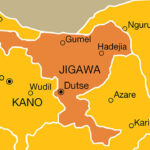Villagers have legalised hunting and killing of wildlife to the extent that certain days are set aside every year in various communities for hunting.
The result of this is that wildlife trading has reached an unprecedented level with the emergence of markets designated for ‘Bush meat’ in different parts of the country while in Abuja and other state capitals, eateries now serve bush meat as special delicacy.
The Minister of Environment, Mrs. Laurentia L. Mallam, recently expressed surprise at the alarming level the quest for bush meat and its trade has assumed.
She called for the adoption of a resolution on illegal trade in wildlife at the United Nations General Assembly billed to hold later in the year. She also advocated for the creation of a special window under the Global Environment Facility (GEF) for the protection of endangered species.
While noting that Nigeria pays high premium on matters that concern conservation of biodiversity and the protection of endangered fauna and flora, the minister added that, “Nigeria is signatory to virtually all global agreements on biodiversity. We ratified the Convention on International Trade and Endangered Species (CITES) in 1974 and our first national legislation evolved 30 years ago has been reviewed with inputs from CITES secretariat and the new legislation has been rated first category by CITES”.
Dr Abraham Chidi, a biodiversity expert, told Daily Trust that Nigeria had done great on the international scene playing crucial roles in the protection and conversation of biodiversity but had done nothing on the domestic front.
“We are seeing a situation where people have the right to walk into the forest and kill whatever animal they come across and nobody is stopping or jailing them, if things remain the way they are in the nearest future our forests would be without any animal,” Chidi said.
He noted that the federal government has failed to domesticate the CITES hence people see animals as something to be killed and eaten rather than to be protected.
Mrs Aisha Takum of the Animal Network Nigeria said government has not done much in protecting our biodiversity.
“We are signatory to so many protocols and convention on the protection of biodiversity but everyday our biodiversity is destroyed and displayed in public places yet nobody cares,” she added.
According to a latest research on the vultures of Nigeria published by the US journal PLOS ONE, the population of vultures in the country had declined significantly.
Among the leading facts for the decline was human consumption, followed closely by use for fetish purposes. The lion population in the country is also on the decline and the reasons are obvious.
Global Scale:
A new report by the United Nations Environment Programme (UNEP) and INTERPOL noted that global environmental crime, worth up to $213bn each year, was helping to finance criminal, militia and terrorist groups and threatening the security and sustainable development of many nations.
The report entitled: “The Environmental Crime Crisis, a rapid response assessment”, was released during the just concluded first United Nations Environment Assembly (UNEA), where action to tackle environmental crime was high on the agenda for hundreds of environment ministers, law enforcement officers, the judiciary and senior UN officials.
The illegal trade in fauna and flora (other than fisheries and timber) has been estimated by different sources to be worth 7 to 23 billion dollars annually.
The trade involves a wide range of species including insects, reptiles, amphibians, fish and mammals. It concerns both live and dead specimens and associated products, which are used for pharmaceuticals, food, pets, and ornamental or traditional medicinal purposes. All of these have a significant value not only on the black market, but to national economies if managed sustainably.
The report highlights poaching across many species, including tigers, elephants, rhinos, great apes and Saiga antelopes:
The number of elephants killed in Africa annually is in the range of 20,000 to 25,000 elephants per year out of a population of 420,000 to 650,000. For the forest elephant, the population declined by an estimated 62 per cent between 2002 and 2011. Poached African ivory may represent an end-user street value in Asia of $165 to $188 million of raw ivory, in addition to ivory from Asian sources.
94 per cent of rhino poaching takes place in Zimbabwe and South Africa, which have the largest remaining populations. Here, the involvement of organized syndicates has seen poaching rise from less than 50 in 2007 to over 1,000 in 2013. Rhino horn poached last year is valued at around $63 to $192 million.
Even conservative estimates suggest that the illegal trade in great apes is widespread. From 2005 to 2011, a minimum of 643 chimpanzees, 48 baboons, 98 gorillas and 1,019 orangutans were estimated to have been lost from the wild through illegal activities. The real figure is more likely to be around 22,000 great apes lost to the wild over that period.
Nigeria therefore cannot afford to be left behind in the international struggle to halt wildlife trading. Now is the time to initiate and purse a national legislation that would make the killing, selling and eating of bush meat an offence.
 Join Daily Trust WhatsApp Community For Quick Access To News and Happenings Around You.
Join Daily Trust WhatsApp Community For Quick Access To News and Happenings Around You.


